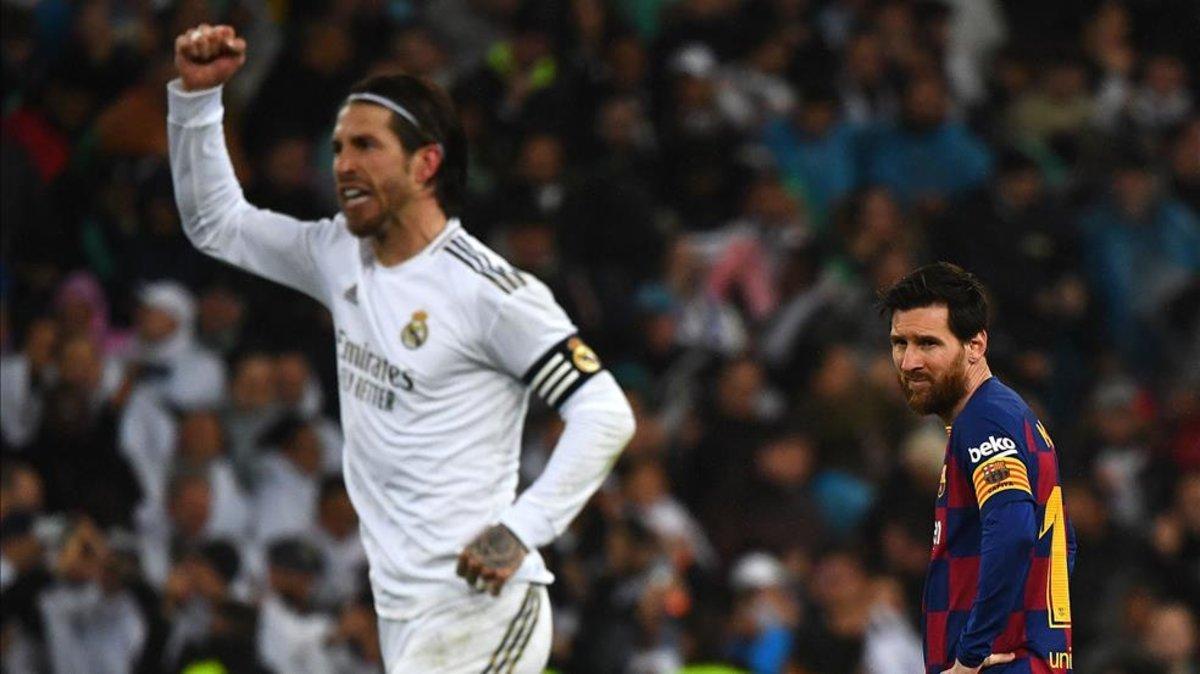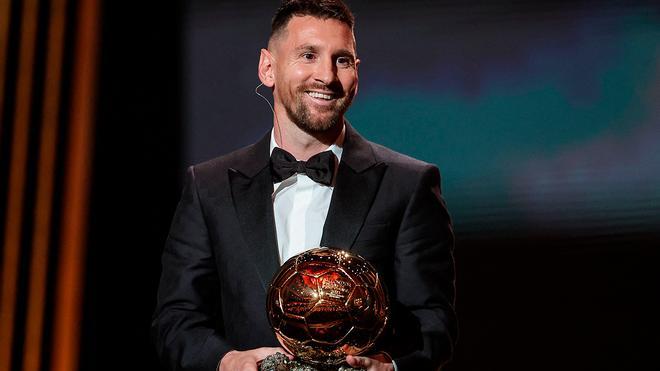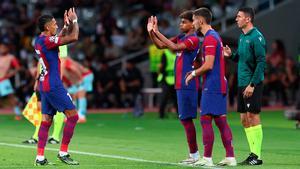Barça, Madrid and the decline of the Clasico

"It's become routine," Gerard Pique laughed in the dressing room at the Santiago Bernabeu last season after another Barcelona win at the home of their Clasico rivals Real Madrid.
In behind-the-scenes footage from the Matchday documentary, joking with his teammates, he added: "It's no fun winning here anymore: 0-3, 0-4, 0-5..."
Pique's tune was different on Sunday when Barca, who had won six of their last eight games at the Bernabeu, gave up top spot in La Liga as they were beaten 2-0 by Madrid.
"It was one of the worst Madrid sides I've faced at the Bernabeu in the first half," the defender told reporters after the match, despite the defeat.
Pique continued by saying he didn't mean that as a "criticism" of Madrid but, in a roundabout way, of both teams as the quality of this fixture declines.
"We all have problems -- we aren't doing that well, either," he said. "But we missed an opportunity to hurt them. We had control of the game and if we take advantage of a couple of our chances in the first half it leaves them with a mountain to climb."
The Clasico has been Spain's biggest game for years but since the turn of the millennium its global appeal has really ramped up. Television coverage around the world and the emergence of social media has increased access to the spectacle.
The Barca side built by Pep Guardiola took the interest to the next level as Xavi, Andres Iniesta and Lionel Messi dominated games domestically and in Europe in a way never previously thought possible.
Jose Mourinho's appointment at Real Madrid added to the intrigue, as did a run of four Classics in 18 days in 2011: a two-legged Champions League semifinal, a league meeting and the Copa del Rey final.
Guardiola and Mourinho left but the intensity was sustained through the lens of the rivalry between Lionel Messi and Cristiano Ronaldo, who left for Juventus in 2018 but was back in a private box at the Bernabeu for Sunday's game.
The feeling now, though, is represented through Pique's comments: the Clasico is not what it was.
Madrid's weekend win took them one point clear of Barca with 12 games to play. They have 56 points from 26 games. They are averaging 2.15 points per game, a figure that would not have been enough to win the league title since Guardiola took over Barca in 2008.
In Guardiola's first season in the Camp Nou dugout, Barca averaged 2.29 points per game on their way to the title. They hit 2.61 and 2.53 points per game in each of the next two seasons. Madrid ended their reign with a 100 point campaign (2.63 points per game) and Barca responded by hitting the same tally the following year.
Atletico briefly interrupted the duopoly before Barca went on to win four of the next five Spanish titles. Last season, though, their points total dropped below 90 for the first time since 2008-09. They clinched the title with 87 points, 2.29 per game.
It will likely take less than 90 to win it again this season. Both teams would have to win all 12 of their remaining fixtures to break the 90-point mark. That's not likely when you look at the shape both sides are in.
You could argue other teams have improved, and some have. Getafe have transformed into a machine under Jose Bordalas and Real Sociedad have played some of the best football in Spain this season. Atletico, Sevilla, Valencia and Athletic Bilbao will always challenge Barca and Madrid in one-off games, too.
But look closer and you will see it's not necessarily those sides that have taken points off the apex predators. Madrid's two league losses have come at Mallorca and Levante. Barca were beaten at Levante, too, and also at Granada. They were held to a draw by Osasuna. Teams increasingly believe they can beat the big two, especially when they play at home. It's not the precession it was 10 years ago.
The quality may continue to dip in the coming years as well. Both sides are in the process of evolution. Pique, Sergio Busquets, Jordi Alba and Lionel Messi are among Barca’s 30 plus stars. Madrid, too, will soon have to think about life without Sergio Ramos, Marcelo, Luka Modric and Toni Kroos.
The baton will be passed to Frenkie de Jong and Fede Valverde; to Ansu Fati and Vinicius Jr; and to any number of big-money signings both clubs will undoubtedly make in a bid to maintain standards. The bar has been set so high over the last decade, though, that it may prove difficult to live up to expectations.
The other Pichichi
The other Pichichi
Barca’s men may have failed to take their chances at Madrid on Sunday but the women’s team are having no such problems. They beat Madrid CFF 5-0 as they continued their march towards a first league title since 2015. Less clear is who’s going to walk away with the Pichichi: Jenni Hermoso or Asisat Oshoala? Hermoso stole a march on her Nigerian teammate this weekend with a hat-trick. She now has 23 league goals this season but Oshoala is in close pursuit on 20.
Stretched resources
Stretched resources
Barca's poor squad planning at first-team level has had a ripple effect within the club. The fact Quique Setien has regularly had several B team players in his matchday squads has left the B team short. As a result, they’ve drawn their last two games, the latest against bottom club Orihuela on Sunday, and are now four points off the top as they target promotion to the Spanish second division. To make up the numbers, they’ve been using players from the U19s (Juvenil A), who in turn lost to title rivals Real Zaragoza this weekend, ending a run of 11 straight wins in the league. Their lead at the top is down to two points.
Topics with the letter




